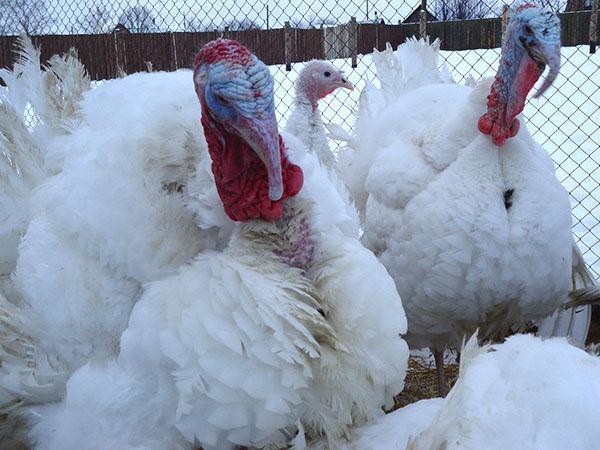Growing broiler turkeys "Big-6"
 Turkeys of the Big-6 breed grow up to 20-24 kg of live weight by the age of six months. This broiler breed has a fairly high egg production. A turkey lays 100 eggs in one year. The downside of this breed is that, due to the large weight during mating, the turkey very rarely fertilizes the female. Therefore, incubation stations are engaged in breeding this breed.
Turkeys of the Big-6 breed grow up to 20-24 kg of live weight by the age of six months. This broiler breed has a fairly high egg production. A turkey lays 100 eggs in one year. The downside of this breed is that, due to the large weight during mating, the turkey very rarely fertilizes the female. Therefore, incubation stations are engaged in breeding this breed.
The active sexual stage in these turkeys begins at 6 months, but since they rarely give birth at home, at this time an adult bird is slaughtered. To get a good yield of meat, it is important to choose the right feed base, and to prevent diseases. Let's consider the most suitable feed for turkey poults and adult birds.
Feed base for turkeys
It is very important to feed turkey poults with starting compound feed up to 1.5-2 months. No need to mix barley, corn or any other solid feed and completely replace the starter feed with them. Turkeys need to get all the nutrients they need to grow.
Solid feed is mixed into the feed compound feed from the age of two months of chicks. Mustard, nettle, green onions and other herbal feeds can be added to starter feed starting from the third day keeping turkeys.
Corn gives a turkey's skin a beautiful yellow color and meat gives a healthy reddish hue. Gradually, fattening compound feed can be removed from the diet of turkeys. Then they will gain less weight, which is good for selling whole carcasses. If you keep turkeys on grain and green feed from the fourth to the sixth month, then their meat will be tastier. For turkeys to continue to gain weight with this feeding, they must be gradually switched to grain feed. In addition, to feed an adult bird, you will need much more grain feed than factory feed.
Keeping turkeys
Each adult requires 2 m2 area. This will allow the turkeys to walk around the enclosure, and most of the nutrients will be processed into muscle fibers. Turkeys of the Big-6 breed are kept in a closed enclosure indoors, as this breed does not tolerate even the slightest drafts. The high side of the enclosure will not allow turkeys to fly to another part of the house and minimize the risk of developing viral diseases in adult birds.
The disadvantage of this breed is its low natural immunity, so it is necessary to prevent various diseases and vaccinate young turkeys against Newcastle disease.